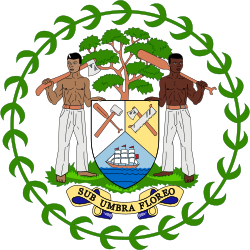Political culture
In 1950, after the general worker union had been formed, the people's committee constituted itself as the PUP (People's United Party) and taken the majority seating in the elected Belize city council. [1] When Belize became fully independent and joined in the Commonwealth [2] on September 21, 1981, the two parties UDP (United Democratic Party) and PUP rose in the political scene. [3] This made an effect two-party system. [3] The UDP believes in pro-business and the PUP believes in pro-labour but both are closely centred in the spectrum. [3] The PUP foster the idea of political independence but their opposition UDP believe in the national interest of equitable distribution of public services from the government. [1]
The party system is dominated by the centre-left People's United Party and the centre-right United Democratic Party. There have been other small parties that have participated at all levels of governmental elections in the past. Although none of these small political parties have ever won any significant number of seats and/or offices, their challenge has been growing over the years.
This page is based on this
Wikipedia article Text is available under the
CC BY-SA 4.0 license; additional terms may apply.
Images, videos and audio are available under their respective licenses.
